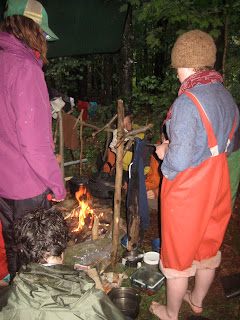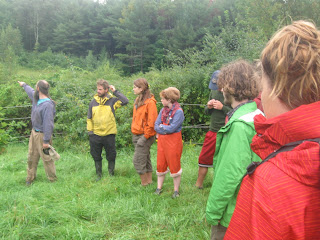Hello everyone!
I would like to start off this update by letting all of you back home know exactly what role each of us have been playing in our ever solidifying community. Last week, each of us got what we call here at Kroka our “Big Jobs.” Big Jobs consist of certain aspects for which we are responsible for to keep our community running smoothly.
Kestrel is our medic. Her responsibilities include mending all of our various wounds, handling and knowing how to properly use the medical kit, and learning about and recording an array of various plants and herbs to use for teas, salves, tinctures, or any other such needs that may arise. Leah, our logistics manager, is in charge of getting us where we need to be at the proper time as well as waking us up in the morning to the beauty of her songs. Hytham is responsible for creating fire wherever it is needed, mastering a type of primitive fire-making (the bow-drill in this case), maintaining the fireplaces we use for cooking, and having fire-making materials at the ready at all times. Noah is the arts and crafts manager, who more recently, was spearheading the maintenance of the sewing machines we were using to create our backpacks. His responsibilities also include keeping track of all of our arts and crafts materials and finding crafts for us to do during our down time, such as when we are on our way to Ecuador.
Leo is the bike and gear manager, which means that he is in charge of knowing what gear the group needs for each expedition we undertake, keeping track of and maintaining it all, and knowing how to repair our bikes as needed. Zoe is the treasurer and semester book manager whose responsibilities are to assign and to edit all our semester book pages as well as to keep a running log of all our group money and to facilitate our use of it. Isabelle, our kitchen manager, is responsible for providing us with yummy meals and maintaining our various cooking situations, be they at Kroka or otherwise. Hila is the food manager, who works to ensure that we have all the food we need at Kroka and away from Kroka as well as creating meal-plans for each week during the semester (we have enjoyed them all an incredible amount thus far).
Clayton is our photographer and energy manager, who has been taking beautiful snapshots of our life here at Kroka and who is in charge of monitoring the solar system. Robert is our trusty navigator, responsible for planning the routes we will take on each of our expeditions, knowing how to properly use maps, and having an ample knowledge of the geography of the land. Nelly took on the very fitting role of farm manager,
thus being in charge of milking Daisy the Kroka cow nearly every morning, learning how to keep a farm running smoothly, having a knowledge of different farming methods, and working with and maintaining the health of not only the vegetable gardens but also the farm animals. Ezra is our camp manager, meaning that his responsibilities are to keep our home at its best, to know how to set up temporary camps during our expeditions, and to make sure we are keeping our living spaces and kitchen clean and functioning. Finally, as all of you already know my big job is documenter and scribe which entails providing you all with updates as to how we are all faring throughout the semester and keeping a running log of our day to day activities. Although each of our big jobs come with a great deal of responsibility for every one of us, we are stepping into our roles with a grace and openness that will, indubitably, provide for a truly beautiful time on the semester.
More recently, this Thursday we returned from our first expedition – soaked through with chilly rainwater, sweaty, and sporting some lovely streaks of chain oil on our legs, yet incredibly and completely elated. All days of our bike trip save the last and a few very precious hours in between, the rain beat into our bodies as we sailed up and down the mountainous terrain of New Hampshire and Vermont. On Monday, as directed by Robert, our plan was to bike roughly fifteen miles to Hillside Farm in West Moreland New Hampshire. However, to our chagrin, several of the roads we had planned to take to reach our destination seemed to no longer exist or had been changed to dead end roads and thus we ended up following a series of detours, stopping a few kind New Hampshire residents to ask for directions, and (the true challenge and climax of the first adventure of our biking expedition) we biked about twenty plus miles. On that day we faced some of the most challenging hills while the rain pelting down on us stuck our clothes and our bodies, keeping us cool as we soldiered on towards our destination.
 When at last we reached Hillside Farm, the sun was just sinking behind the mountains, shedding its final rays over the little nook in the woods we had chosen to set up our camp through the night. That first night of the expedition we truly banded together as a community – pushing ourselves through the discomfort of cold fingers to chop and saw firewood; leaping up trees to secure our tarp and hauling slippery rocks together to create a fire place – and finally, when all was said and done we gathered around the fire to sing and give thanks for the warmth of our community and the meal we worked so hard to create. Through the kindness of Frank, the farmer who runs Hillside Farm, we were able to sleep in a cozy hay barn for the night, an arrangement that continued for the remainder of our trip.
When at last we reached Hillside Farm, the sun was just sinking behind the mountains, shedding its final rays over the little nook in the woods we had chosen to set up our camp through the night. That first night of the expedition we truly banded together as a community – pushing ourselves through the discomfort of cold fingers to chop and saw firewood; leaping up trees to secure our tarp and hauling slippery rocks together to create a fire place – and finally, when all was said and done we gathered around the fire to sing and give thanks for the warmth of our community and the meal we worked so hard to create. Through the kindness of Frank, the farmer who runs Hillside Farm, we were able to sleep in a cozy hay barn for the night, an arrangement that continued for the remainder of our trip. The following day, we helped out on the farm by cutting and sorting garlic, hauling rocks to fill in swamped areas, and clearing brush from beneath apple trees. In addition we learned the difference between biodynamic and organic farming (Hillside is a biodynamic farm). Biodynamic farms use many homeopathic remedies and techniques to maintain their farm, such as following a certain planting schedule determined by the path of the sun and moon. The most important aspect of biodynamic farming however, what makes it different from any other type of farming, is that the farm is treated and regarded as an entire organism and artificial fertilizers, toxic pesticides and herbicides are strictly avoided
We then departed for Vermont Shepards Farm, a roughly 20-mile trip, near Putney, VT. On our way there we faced the challenge of biking up one of the longest, seemingly never-ending hills, nay mountains (a much more fitting term) we would or had faced throughout the trip. When we reached our destination, we once again set up camp in the pouring rain; inspired by the beauty of the land around us and the passion of the community within us.
The next day we helped Dave Major, the owner of Vermont Shepards in a variety of tasks. Nelly, Ezra, Hytham, Clayton and Leo moved pastures to ensure that the nutrient-rich sheep manure would be spread evenly throughout the farm and that the grass would remain lush and healthy. Some of the fences were sorely in need of repair, so the rest of us jumped on the task. Isabelle and Zoe worked at shaving black locust fence posts of their bark; Leah, Kestrel, Thomas, and myself loosened the old rotting posts from their muddy prison while Noah and Robert pounded the new posts down, down, down until they were secure in the earth. All the while the rain was drenching our bodies. When all work was done we enjoyed some truly scrumptious Sheep’s yogurt swirled with maple syrup and even got the chance to visit Vermont Shepards' cheese cave receiving as gifts incredibly delicious cheeses.
We then set out for the final farm on our tour: Harlow's farm. At Harlow's we were able to observe the final steps of the chicken-slaughtering process and were gifted with chicken feet for soup broth and livers to cook for our dinner that night. After enjoying a fine feast of chicken and vegetable soup (a recipe developed by our lovely cooks of the week – Kestrel, Leah, Zoe, and Noah), liver, rice, and a beef stew that Paul Harlow was kind enough to give to us, we settled down for our last night in a hay barn.
The following morning we packaged onions for sale and learned how to make sausage – preparing the chicken meat, cutting rich, red peppers, sweet apples, fragrant basil, and a variety of spices to create two different sausage types: a sweet sausage and a savory sausage. Zoe found her calling as a sausage connoisseur and Hytham and Ezra mixed all the sausage ingredients together in preparation for the most delicious sausages I have, personally, ever tasted. Harlow's farm was hit hard by the hurricane and lost the majority of their crops as a result and thus, a few of us (Robert and Ezra specifically) helped some of the employees to test the remaining crops for any potential flaws and contamination the vegetables may have that would make them impossible to sell.
After enjoying our last lunch at a farm, we headed home – relishing in the beautiful day that lay out in front of us; the azure sky glimmering with the sun that we had sorely missed throughout the duration of our trip. Although it rained for the majority of our trip, we learned not only about farming but also about the power within us – the power to preserve; the power of happiness and of community. For at the end of it all, we were overjoyed.
Quote of the Week: Does this hill even have a top? (NHESP '11)














As grandparents of Leah, we feel very priveleged to receive these reports via Leah's mom. We greatly admire your perseverance during all kinds of adverse circumstances. Certainly, you will be well prepared for whatever challenges you will face in Ecuador! And--Aster, we are sure you have a future as a writer as you paint pictures with words! Gr & Gr Davis
ReplyDeleteI am so proud of what you are all accomplishing. I have camped and backpacked in the rain for many days on the Appalachian Trail in 2003 and I know that mix of fatigue and total excitement very well. Good luck to all of you! Leah, you rock!!
ReplyDelete